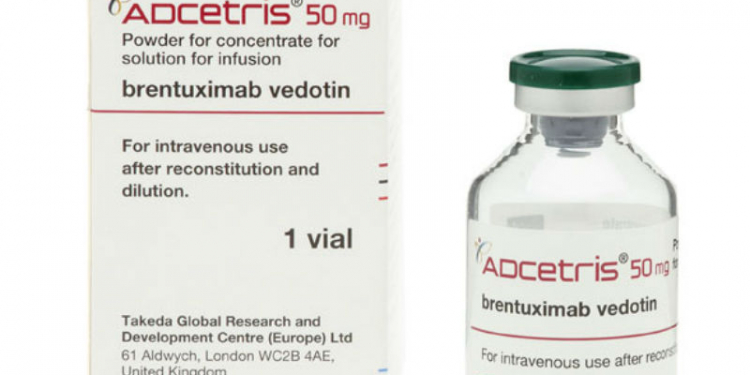The FINANCIAL — Takeda Pharmaceutical Company Limited on January 22 announced that the European Commission (EC) extended the current conditional marketing authorization of ADCETRIS (brentuximab vedotin) and approved ADCETRIS for the treatment of adult patients with CD30-positive cutaneous T-cell lymphoma (CTCL) after at least one prior systemic therapy.
ADCETRIS is an antibody-drug conjugate (ADC) directed at CD30, which is expressed on skin lesions in approximately 50 percent of patients with CTCL. The decision follows a positive opinion from the Committee for Medicinal Products for Human Use (CHMP) on November 9, 2017.
“CTCL is a subtype of non-Hodgkin lymphoma that primarily involves the skin; it typically presents with red, scaly patches or thickened plaques of skin that often mimics eczema or psoriasis and can have a substantial impact on patients’ self-esteem. There are few approved CTCL treatment options with only limited efficacy, creating a significant unmet need for these patients,” said Julia Scarisbrick, M.D., Department of Dermatology, University Hospital Birmingham, Birmingham, UK. “The approval of ADCETRIS in this setting brings a much needed, effective treatment option to patients living with CTCL and I am looking forward to be able to offer this treatment to CD30-positive patients who have received one prior systemic therapy.”
“Today’s approval is an important milestone for the CTCL community in Europe, and further reinforces the role ADCETRIS may have in improving outcomes and quality of life for patients with CD30-positive malignancies,” said Jesus Gomez Navarro, M.D., Vice President, Head of Oncology Clinical Research and Development, Takeda. “The clinical data that supported this approval are exceptionally strong. We are proud to be the company to bring a novel treatment option with impressive efficacy and a manageable safety profile to appropriate CTCL patients in the European Union.”
“As a distinct subset of non-Hodgkin lymphoma, cutaneous lymphoma is generally visible on the skin, and can cause significant discomfort. This can result in serious emotional distress and impacts qualify of life for patients who are afflicted,” said Susan Thornton, CEO, Cutaneous Lymphoma Foundation. “There is no known cure, and only a few new treatment options have been introduced over the last several years. This is a welcome new treatment option for cutaneous lymphoma patients in Europe.”
This approval is based on data from the randomized, open-label Phase 3 ALCANZA trial, which demonstrated that single agent ADCETRIS provided a highly statistically significant improvement in the overall response rate lasting at least four months (ORR4) versus the control arm of methotrexate or bexarotene as assessed by an independent review facility (p-value <0.0001). The ORR4 was 56.3 percent in the ADCETRIS arm compared to 12.5 percent in the control arm. The study also showed that complete response rate, progression-free survival and reduction in the burden of symptoms during treatment, as measured by the Skindex-29 questionnaire, were all highly statistically significant in favor of the ADCETRIS arm. The safety profile associated with ADCETRIS from the ALCANZA trial was generally consistent with the existing prescribing information. The most common adverse events of any grade include: peripheral neuropathy, nausea, diarrhea, fatigue, vomiting, alopecia, pruritis, pyrexia, decreased appetite and hypertriglyceridemia. In the ADCETRIS arm, the most common grade 3 or 4 events were peripheral sensory neuropathy (no grade 4 events), fatigue, diarrhea, nausea, vomiting and pruritis. In the control arm, the most common grade 3 or 4 events were hypertriglyceridemia, pruritis, fatigue and pyrexia. Updated results from the trial were recently presented at the 59th American Society of Hematology (ASH) Annual Meeting in December 2017. Long-term analyses from the ALCANZA trial continue to provide compelling evidence of improved response rates, progression free survival and quality of life with ADCETRIS vs. the control arm, according to Takeda.
This decision by the European Commission means that ADCETRIS is now approved for marketing of this indication in the 28 member states of the European Union, Norway, Liechtenstein and Iceland.






























Discussion about this post